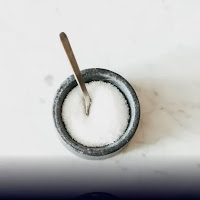A global success story and a legacy to be protected: UNICEF’s role in the virtual elimination of iodine deficiency through Universal Salt Iodization (USI)
Nowadays, if you ask a staff member – or anyone – about eliminating iodine deficiency, they likely won’t know about it. That’s a pity, because it’s one of the most remarkable public health success stories of our time, and UNICEF’s work was at the heart of the effort.Adequate iodine is crucial to children’s ability to reach their full potential and benefit fully from their education. Insufficient iodine during pregnancy leads to lasting brain damage that can reduce a child’s IQ by 8-15 points. Mild to moderate deficiency at school age can reduce IQ by 3-5 points.
Iodine deficiency existed worldwide, but was tackled by adding minute amounts of iodine to household salt, at a cost of just US 5c per person yearly. Every dollar spent on salt iodization yields an average $30 return through improved childhood learning, leading to greater productivity and better livelihoods, boosting the economies of their nations. Since efforts began in 1990, some 720 million clinical cases of iodine deficiency have been cured and prevented. Annually some 20.5 million neonates are protected, averting economic losses of tens of billions of dollars.
This achievement came about through a series of steps: gathering scientific evidence; adoption of World Health Assembly resolutions; setting an ambitious goal at the 1990 World Summit for Children, and donor support (including Canadian, Dutch and US governments, and the Bill & Melinda Gates Foundation). At its heart was a powerful partnership involving governments, the salt industry, civil society (most notably Kiwanis International), NGOs (such as Iodine Global Network, Global Alliance for Improved Nutrition, Nutrition International) and donors.
The unwavering dedication and leadership of James P. Grant, who travelled the world, salt test kits in pocket, secured governments’ commitment to iodize salt. Carol Bellamy oversaw the critical years of program implementation, and partnership building. In 2020, WHO reported that the number of iodine deficient countries was down from 110 in 1993 to 19 countries in 2017. Without UNICEF’s advocacy and support to national programmes, such results would not have been achieved in such a short time.
But recently, WHO noted that by 2020, 21 countries were iodine deficient, and expressed concern about the status of vulnerable groups such as pregnant women. Unlike polio and smallpox, iodine deficiency cannot be eradicated, but must be kept at bay through perpetual salt iodization. Knowledge about the importance of iodized salt has slipped away. Policymakers and the public no longer understand its benefits, impacting demand, program implementation and performance. Diets are changing, with more reliance on processed foods that may not use salt that is iodized. There is also unnecessary confusion around the reduction of salt intake for other health reasons.
Data for many countries are more than ten years old. And even in countries where national status is adequate, significant population segments may face deficiency. Monitoring systems in many countries are slipping, and financial resources to support programs have faded in the face of other challenges such as conflict and instability, climate change, economic hardship and COVID-19.
But the demands of today must not divert our attention from a global problem that may be re-emerging. In the years since the program began, our strategies have rightfully become more integrated and comprehensive, but adequate iodine nutrition must remain an integral part of those strategies, and it’s time to reflect that into our workplan. We are powerful advocates, and can make sure that governments promote and sustain adequate iodine nutrition as part of their nutrition policies and broader fortification efforts. It doesn’t cost anything to bring the issue up in meetings with government leadership, especially in countries where there is concern about programme performance or inequities in salt iodization coverage.
And while we don’t support national programming at the levels we did in the past, UNICEF is still pushing forward to identify cost-effective ways to collect information on iodine nutrition so that we truly understand the situation in the countries where we work. We can continue to engage with the salt industry to keep up their efforts to add iodine to salt, and work with partners like the Iodine Global Network to provide technical advice when national programs need help.
It's important for us to make sure that the gains made are protected and that the foundations of this global success remain strong. While there may not be separate objectives in annual workplans, or availability of specific donor funding, UNICEF has a responsibility to ensure that the importance of iodine nutrition is understood, and the legacy we helped create is protected. So maybe it’s time to put the salt kits back into our pockets, and continue to make sure that children everywhere have access to adequate iodine nutrition so that they can learn better and live better lives.
Werner Schultink is the Executive Director of the Iodine Global Network at Iodine Global Network. He was previously UNICEF's Director of Nutrition.


Very enlightening reminder for us all.
ReplyDeleteAs I live in the US - I always remind in my social circle the importance of Iodized Salt in our diet particularly for young ones.
But ironically find many people are confused when they go to the Grocery Stores with different options of Table Salt on the isles: (1)Salt Iodized (2)Salt Non-Iodized (3)Sea-Salt Iodized (4)Sea-Salt Non-Iodized (5)Himalayan Salt etc - and often time with significant price difference. I have personally witnessed - when asked by the customer (who are not well versed) the floor staff have no idea which one to advise to them! This is the actual status in the most developed country of the world with respect to "Iodized Salt" intake.